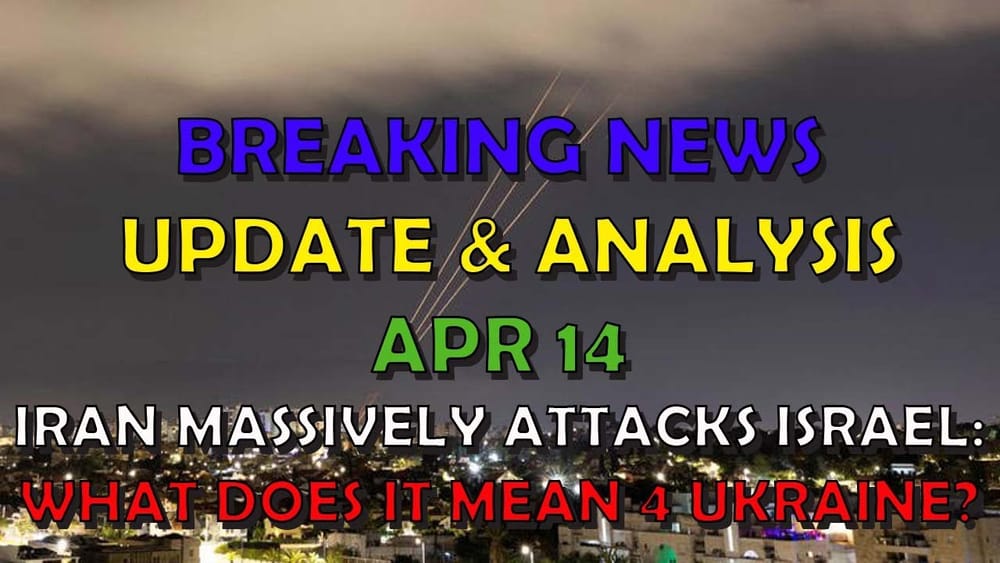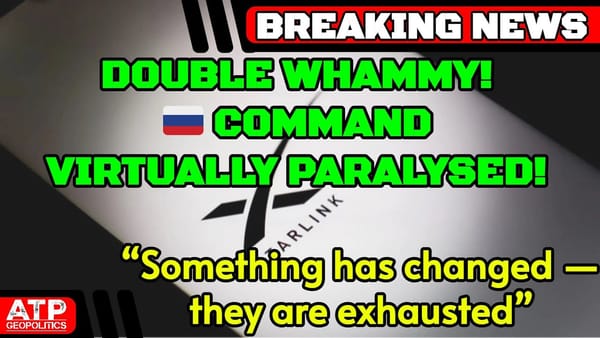Iran/Ukraine BREAKING NEWS: Iran Attacks Israel - Analysis (incl. for Ukraine)
Table of Contents 📖
"Overall, it shows that Ukraine is being made to suffer because it is not a nuclear power."
Hello Team
🎦 00:00-00:31⏩
Jonathan welcomes viewers to a breaking news update on the recent Iranian strikes against Israel. He outlines that the video will cover the events leading up to the attack, the attack itself, the potential ramifications, and how this might affect aid to Ukraine.
Return to top⤴️
Background: Iranian Commanders Killed in Israeli Strike
🎦 00:31-02:07⏩
Jonathan rewinds to April 1st when three high-ranking Iranian commanders were killed in an Israeli strike on the Iranian embassy in Syria, prompting Iran's retaliation. He ponders whether Iran's subsequent actions were telegraphed to Israel, considering the difficulty of covert operations in the modern age. He suggests that Iran might have intentionally made their intentions public, allowing Israel time to prepare.
Return to top⤴️
Iran Attacks Israel - Details & Allied Response
🎦 02:07-06:28⏩
- Jonathan outlines how Iran launched a wave of drones, cruise missiles, and ballistic missiles toward Israel.
- Despite the scale of the attack, Israel, aided by preparations and support from allies like the US, UK, and Jordan, successfully neutralized the majority of the threats.
- According to reports, almost all drones were intercepted, with a 93.6% interception rate for ballistic missiles and a 100% interception rate for cruise missiles.
- Jonathan highlights the involvement of US warships and fighter jets in the eastern Mediterranean, alongside UK and Jordanian forces, in intercepting Iranian projectiles. He notes the significant involvement of the UK, with potentially 30 drones intercepted.
- Despite some missiles hitting an Israeli airbase, the damage was minimal, showcasing the effectiveness of Israel's and their allies' defence systems.
Analysis of Iran's Strategy & Potential for Greater Damage
🎦 06:28-07:51⏩
- Jonathan analyses the attack, drawing upon expert commentary and observations. He notes Shashank Joshi's (The Economist) point that most launches originated from Iran, with a few from Iraq and Yemen, suggesting the use of proxies.
- He raises a crucial question about the timing of the attack - had Iran retaliated immediately, catching Israel off guard, the outcome might have been far more devastating. The two-week delay allowed Israel and its allies ample time to prepare and coordinate a defence.
What Next? Analysing Possible Israeli Responses and International Implications
🎦 07:51-09:02⏩
Jonathan shifts to potential Israeli responses, pointing out the hawkish stance of Israel's government under Netanyahu. He anticipates a strong reaction and highlights the possibility of escalation into a broader conflict. Jonathan emphasizes the complex geopolitical situation, comparing it to "4D chess," and underscores the importance of the US's role in managing the situation.
Return to top⤴️
Differing Opinions on How the US Should Respond
🎦 09:02-12:12⏩
Jonathan discusses the potential US response, suggesting that the Biden administration might favour de-escalation due to the risk of a wider conflict, potentially a World War III scenario. He contrasts this with the views of those who advocate for a forceful military response against Iran. Jonathan refrains from giving a definitive opinion, acknowledging the complexities and the lack of complete information.
Return to top⤴️
Jonathan Predicts Trump's Reaction - Self-Serving and Narcissistic
🎦 12:12-12:37⏩
Jonathan believes that Israel will likely opt for retaliation and predicts that the US, UK, and other allies will try to moderate Israel's response. He predicts that former President Trump would react to the situation by making it all about himself, prioritising his narcissistic need for attention over genuine concern for Israel or the geopolitical situation.
Return to top⤴️
Trump's Predictable Response - "It wouldn't have happened if I were President"
🎦 12:37-13:35⏩
- Jonathan's prediction about Trump's reaction proves accurate as Trump posts on Truth Social, "Israel is under attack. This should never have been allowed to happen. This would never have happened if I were president."
- Jonathan criticizes Trump's statement for lacking any meaningful support for the US government or Israel and instead focusing on self-praise and criticism of the current administration.
Republican Response - Exploiting the Situation to Undermine Biden
🎦 13:35-16:48⏩
Jonathan analyses the reactions of various US politicians, highlighting the partisan divide in their responses. He criticizes Republican Speaker Mike Johnson for attempting to capitalize on the situation by accusing the Biden administration of undermining Israel and blocking aid, a claim that Jonathan debunks with evidence of Johnson's ties to Russia and his obstruction of a bipartisan Senate bill providing aid to Ukraine, Israel, and Taiwan.
Return to top⤴️
Potential Impact on Ukraine Aid: A Silver Lining?
🎦 16:48-18:30⏩
Jonathan explores the potential ramifications of the Israel-Iran conflict on Ukraine. He speculates that the situation might inadvertently benefit Ukraine by prompting a bipartisan push in Congress to approve the stalled aid package. He suggests that the need to support Israel could force Republicans to set aside their reluctance to aid Ukraine, potentially leading to the passage of the Senate bill or a discharge petition to compel a vote in the House.
Return to top⤴️
The Importance of Nuclear Weapons - Analysis by Phillips O'Brien
🎦 18:30-22:51⏩
- Jonathan delves into a thought-provoking analysis by Phillips O'Brien, who compares the international response to the Iranian attack on Israel with the response to the Russian invasion of Ukraine.
- O'Brien argues that the stark difference in support highlights a concerning message - that possessing nuclear weapons guarantees protection and aid, while lacking them leads to suffering and limited support.
- Jonathan agrees with O'Brien's assessment, expressing concern over the message this sends to nations considering developing nuclear weapons for their security. He points out the hypocrisy of the US criticizing Iran's nuclear ambitions while actively aiding a nuclear-armed Israel, sending a dangerous message that nuclear proliferation might be the only path to true security.
Ukraine Aid Update: Shifting Political Landscape & Potential for Loans
🎦 22:51-24:01⏩
Jonathan cites Phillips O'Brien's insights into the potential for the Ukraine aid bill to be brought to a vote, driven by the need for bipartisan cooperation in the House and the increasing pressure to provide aid to Israel. He highlights the possibility of a compromise where aid to Ukraine is structured as loans, which, while not ideal, could be a politically palatable solution.
Return to top⤴️
Calls for Action: GOP Representatives Urge Support for Israel and Ukraine
🎦 24:01-26:46⏩
- Jonathan discusses the responses of various GOP representatives, noting the careful language used to avoid explicitly supporting Ukraine. He highlights the comments of GOP Representative Mike Lawler, who calls for immediate action to aid both Israel and Ukraine, suggesting the use of the existing Senate bill.
- Jonathan expresses hope that this might signal a willingness to sign a discharge petition if Speaker Johnson continues to block the bill.
- He then analyzes the exchange between Democratic Representative Eric Swalwell and GOP Representative Steve Scalise. Swalwell criticizes Scalise for focusing solely on aiding Israel without mentioning Ukraine, implying that this is further evidence of Russian influence within the GOP.
Will Increased Support for Israel Translate to Support for Ukraine?
🎦 26:46-28:28⏩
- Jonathan speculates about the potential impact of the Iran-Israel conflict on Ukraine aid, questioning whether the Republicans' strong support for Israel will extend to supporting Ukraine.
- He notes that this situation allows Republicans who are secretly in favor of aiding Ukraine to voice their support more openly, using the Iranian attack as cover to deflect potential backlash from the pro-Russia faction within their party.
Exposing Trump and the GOP's Weakness on Iran - Adam Kinzinger's Insights
🎦 28:28-30:30⏩
Jonathan features former Republican Representative Adam Kinzinger, who directly challenges Trump's claim that the Iranian attack wouldn't have happened under his presidency. Kinzinger argues that Trump's past inaction and weakness on Iran, particularly following attacks on US troops in Iraq, demonstrate the hollowness of his statement.
Return to top⤴️
Consequences of Trump's Actions: Emboldening Iran & Weakening the West
🎦 30:30-31:27⏩
- Jonathan highlights a comment from Simon Rosenberg, a Democratic strategist, who argues that Trump's blocking of military aid to Ukraine and Israel during his presidency contributed to the current situation, emboldening Iran and endangering both Israel and the US.
- Jonathan agrees with this assessment, emphasizing the long-term consequences of Trump's actions.
Phillips O'Brien's Analysis: The Disparity in Defending Ukraine vs. Israel
🎦 31:27-34:39⏩
Jonathan returns to the analysis by Phillips O'Brien, who details the significant disparity in how the US supports Israel's defence compared to Ukraine's. While the US actively assisted Israel in intercepting Iranian missiles, they have restricted Ukraine from utilizing similar tactics against Russia, highlighting a double standard based on the presence of nuclear weapons. This disparity puts Ukraine at a distinct disadvantage, forcing them to fight a defensive war with limited options.
Return to top⤴️
The US's Flawed Logic: Encouraging Nuclear Proliferation for Protection
🎦 34:39-40:40⏩
Jonathan continues reading O'Brien's analysis, which criticizes the US's approach to the conflicts in Ukraine and Israel as ultimately encouraging nuclear proliferation. By actively defending nuclear-armed Israel and restraining non-nuclear Ukraine, the US sends a clear message: possessing nuclear weapons is the only way to guarantee protection. This policy, according to O'Brien, is "about as extreme a pro-escalation policy as the US could devise," as it incentivizes more countries to seek nuclear weapons for security.
Return to top⤴️
Potential for Ukraine Aid: Reasons for Optimism and Potential Hurdles
🎦 40:40-44:07⏩
Jonathan concludes his analysis by discussing the possibility of a vote on the Ukraine aid bill in Congress. He mentions information from sources within the Republican Party suggesting a shift in the political climate, making a vote more likely. The reasons for this shift include the need for bipartisanship to pass any legislation, the political risks for Republicans in appearing to obstruct aid to both Israel and Ukraine, and Trump's potential willingness to support loans to Ukraine if it makes him appear in control. However, Jonathan acknowledges potential hurdles, including the need to modify the existing Senate bill to include loans for Ukraine, which could delay the process.
Return to top⤴️
Wrap Up
🎦 44:07-44:18⏩
Jonathan wraps up the extended breaking news update, acknowledging it was longer than usual due to the complex situation and its connection to the war in Ukraine. He invites viewers to share their thoughts and thank them for watching.
Return to top⤴️




